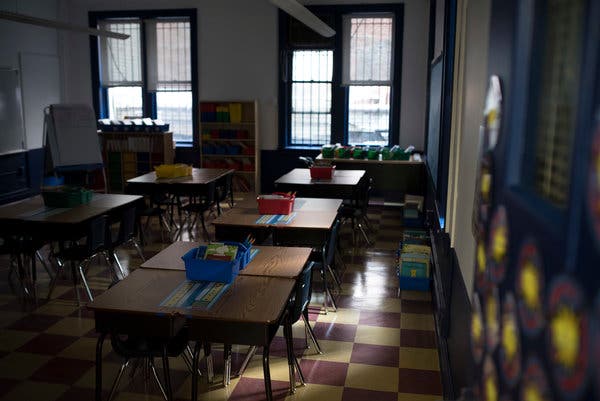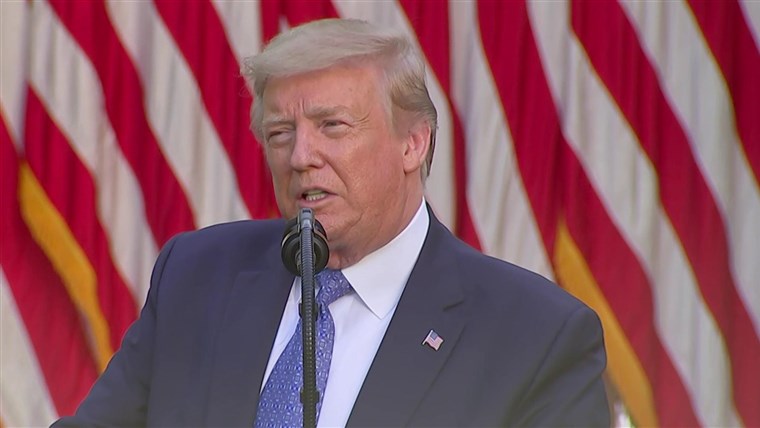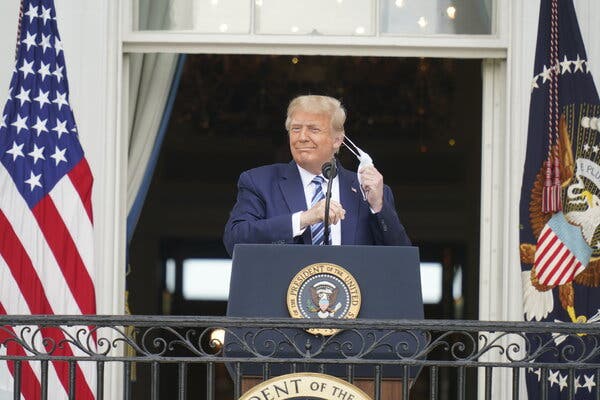Advertisement
Public charter schools, long protected as a bipartisan way to expand school choice, are suddenly in a political battle as both parties shift to other priorities.

WASHINGTON — Public charter schools — caught between growing Democratic disenchantment and a Trump administration shift toward private schools — are preparing for political battle, as the long-protected education sector finds itself on the verge of abandonment.
Betsy DeVos, the education secretary, proposed major changes this month to a federal education fund that for decades has driven growth of charter schools, which typically are run independently but funded publicly and available, often through a lottery, to any child in a school district. In President Trump’s budget proposal for the fiscal year that begins in October, the stand-alone charter schools fund would be dissolved into a broad educational block grant to the states, leaving charters to fight for money with competing educational priorities.
Presidential budgets usually hold little weight, especially when the House is held by the opposition party. But for charter schools, the Trump administration’s shift in emphasis toward private school support comes at a precarious time — Democratic lawmakers have targeted the same federal charter fund.
Last year, the Democratic-led House appropriations subcommittee that oversees the education budget sought to cut the federal charter school fund by $40 million, though funding ultimately remained flat from the year before. This year, charters are bracing for the House to try to zero it out altogether.
Ms. DeVos is scheduled on Thursday to defend the department’s budget requests, which would take an overall 8 percent cut, before the subcommittee. Already, the charter school alliance has begun pleading with its members to lobby lawmakers.
“We’re used to being favored by both sides, and not used to the controversy at the national level,” said Nina Rees, the president and chief executive of the National Alliance for Public Charter Schools. She added, “This is a time that we can show our stripes.”
The Trump administration’s shift was a stark departure from its three previous budgets, which would have increased spending on charter grants, currently funded at $440 million. The new proposal would effectively eliminate the 26-year-old program.
Instead, the fund, along with more than two dozen other programs deemed duplicative and ineffective, would be collapsed into a $19.4 billion block grant — about $4 billion less than current funding — that would be doled out to state school systems that would decide which programs to fund.
Education Department officials said the proposal would reduce bureaucracy, paperwork and federal influence in district-level programming decisions and was not a cut. In a statement, the department called itself “pro-charter, pro-taxpayer and pro-education freedom.”
“While public charter schools are an important educational option for families across the country, and the secretary is unwavering in her support for them, the secretary has always maintained she is agnostic to the type of school, so long as it’s serving students well and parents have the freedom to choose it,” the department said in a statement.
Charter advocates were not comforted. Richard Buery Jr., the chief of policy and public affairs for KIPP public charter Schools, said the charter grant cut was “unnecessary antagonism,” but more concerning was the 28 other programs for low-income public school students being cut.
“This administration has demonstrated year after year true disdain for black and Latino communities with rhetoric, and then reinforces that disdain with funding proposals that regularly demonstrate a lack of support for those communities,” Mr. Buery said.
At the same time, Senators Bernie Sanders and Elizabeth Warren have vowed to end the federal charter schools fund, accusing charters of draining resources from traditional public schools. In recent years, states led by Democratic governors have also taken measures to curb expansion of the schools, which operate in 45 states.
The federal charter schools program has provided both political and practical cover for the sector since its creation by President Bill Clinton in 1994. The funding, which is used for start-up costs that districts cannot often front, is only a small fraction of charter operations, but it is considered vital. Nearly 7,000 charter schools serve nearly 3.2 million students, and 40 percent of them were started with funding from the program, according to the alliance. Nearly 60 percent of charter schools that opened from 2006 to 2016 used the fund.
Those who have the most to lose are charter leaders of color who run single-site schools and disproportionately rely on Washington to fund and expand them.
Jamar McKneely, who heads InspireNOLA, a network of charters in New Orleans, said he was stunned by the proposal. An Education Department official had visited his schools this month to see how he had used the $600,000 a year he has been tapping from Washington. The network’s schools, which are 99.2 percent black, are the highest performing open-admission charters in the city.
“D.C. never sees the personal stories, how these funds touch students,” Mr. McKneely said. “I really hate how the individuals making these decisions are just looking at line items, and many of them don’t even have their kids in schools that look like our schools.”
Last year, Mr. Trump’s budget proposed drastic cuts to the 29 programs that it would turn into block grants this year, including after-school programs for low-income schools and enrichment for gifted students. Amid the backlash, the president personally pitched the block grant concept to Ms. DeVos, according to a senior administration official, to at least preserve programs that districts might want to fund.
Education Department officials said charter advocates are being too risk-averse: The block grant proposal could actually lead to more funding in charter-friendly states where leaders could prioritize charter schools over other efforts, like after-school programs.
The proposal comes, however, as the administration pushes a $5 billion tax-credit program that would fund scholarships for private schools, an effort highlighted in the budget and praised in Mr. Trump’s State of the Union address. The president has bolstered the scholarship program, called Education Freedom Scholarships, with divisive messaging denouncing “failing government schools.”
To some in the charter world, such language affirms that the administration has shifted toward funneling taxpayer dollars to private and parochial schools. Ms. DeVos championed charter school policies in Michigan, and her husband runs one there.
But she is more famous for her advocacy of vouchers to cover tuition at private and parochial schools, and some educators have long feared that her work on behalf of charter schools could harm them politically. There is some sentiment, however, that charters are suffering a self-inflicted wound by historically positioning themselves as neutral ground in ideological choice debates.
“It’s a chicken-come-home-to-roost moment,” said Conor P. Williams, a fellow at The Century Foundation, a left-leaning research group.
Ms. DeVos has also hit the campaign trail as a surrogate for Mr. Trump, promoting school choice, and has used recent appearances to play to his political base. In one speech, she compared abortion rights to slavery and suggested that the left was hypocritical in supporting a mother’s right to choose to have an abortion but not to choose a school for her child.
A visit on Monday by Ms. DeVos to a charter school in New York City was canceled after African-American and Latino families and educators protested the invitation. The planned visit also angered other New York charter school leaders.
“Secretary DeVos wants nothing more than for every student in America to go to the best school for them, which is what makes it such a tragedy that some so-called leaders in the charter movement would rather play politics than highlight their good work on the national stage,” said Liz Hill, an Education Department spokeswoman.
The department dismissed claims that Ms. DeVos was abandoning charters to prop up a tax credit, which could also be used for public school programs and services. Legislation to establish the tax credit program has virtually no chance of getting through Congress, though the department is working to get Democratic sponsors, an official said.
Ms. DeVos’s supporters say she is rightly responding to recent polling that shows increased support for the tax credit scholarship program.
“Parents don’t really care about who supports what, they just want what’s best for their kids,” said Tommy Schultz, a spokesman for the American Federation for Children, a pro-voucher group once led by Ms. DeVos.
Overall, the Trump administration has not given the choice movement the boost that many were hoping for. While the number of students enrolled in voucher, tax credit scholarship and education savings account programs has grown about 17 percent since 2017 — to about 540,400 this year — the number of newly created or expanded programs has slowed down, according to data compiled by the choice-friendly research group EdChoice.
Jason Bedrick, the director of policy for the organization, said he believed the slowdown was due, in part, to the divisive political climate. “We hope there’s a day where people come back together on this issue,” Mr. Bedrick said. “School choice was here long before the Trump administration, and it’s going to be here long after the Trump administration.”



